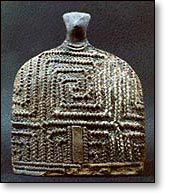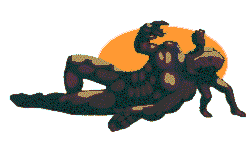
| A B C D E F G H I J K L M N O P Q R S T U V W X Y Z |

| The Goddess in the form of a bird, from Vadastra, Rumania. 4500-5000 B.C. Note the maze or meander pattern, ancient pedigree of the Labyrinth of Crete. Photo: Erich Lessing/Art Resource |
| A B C D E F G H I J K L M N O P Q R S T U V W X Y Z |
|
|
|
|

|

| The Goddess in the form of a bird, from Vadastra, Rumania. 4500-5000 B.C. Note the maze or meander pattern, ancient pedigree of the Labyrinth of Crete. Photo: Erich Lessing/Art Resource |
|
|
